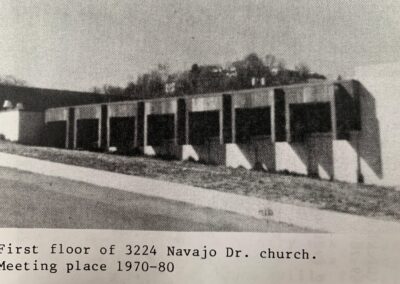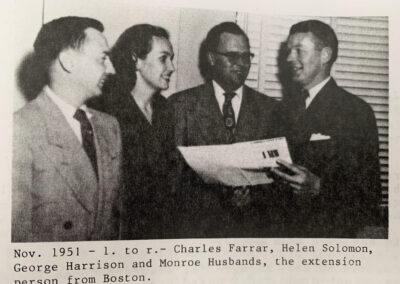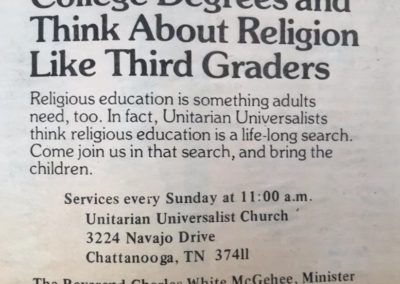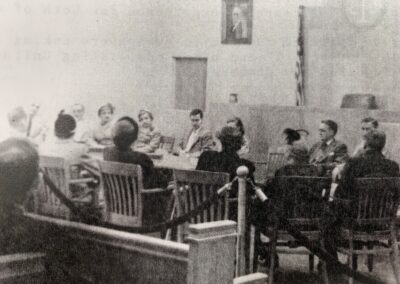About Our Church
The Unitarian Universalist Church of Chattanooga is an inclusive liberal religious community dedicated to the Unitarian Universalist principles. We provide an environment which celebrates life, stimulates creativity and the exchange of diverse ideas, and fosters spiritual and intellectual exploration.We support responsible actions to reduce oppression, preserve the environment, and promote compassionate justice in our larger community. New Here?GiveOur Mission & covenant
Our Mission at UUCC is to C.A.R.E
Create beloved community.
Awaken hearts and minds.
Resist injustice and act with compassion.
Embrace life and care for the earth.
Our Covenant
During the Annual Meeting on June 12, 2016, UUCC voted to accept this Communal Promise as the way we will be together, in community, treating each other with respect:
We journey together bound
in the interdependent web of existence.
We embrace diversity, own our conflicts,
and assume good intentions.
When we fail, we begin again in love.
Justice and compassion shall be our watchwords
and beloved community, our goal.
So, What is Unitarian Universalism?
After my first visit back in 1981, with my two young sons, I immediately knew that UUCC would be my church home. This loving community supported me and allowed me the freedom to grow spiritually and intellectually. I am so grateful for the opportunities to serve within this dedicated community and for the wonderful friendships I have made along the way.
Minister & Staff
Events
Children’s Religous Education
Our Commitment to Social Justice
As Unitarian Universalists, we covenant to promote and affirm the dignity and worth of every person, as well as justice, equity, and compassion in human relationships. We work for the goal of world community with peace, liberty, and justice for all, and respect for the interdependent web of all existence of which we are a part.
Social Justice through the Unitarian Universalist Association
The Unitarian Universalist Association’s (UUA’s) provides programs and materials to enable effective social justice action by congregations and individual members. The Social Justice pages are maintained by the Advocacy & Witness staff group.They exist to represent Unitarian Universalist (UU) values in public discourse and to help congregations be more effective in their social justice work. Current initiatives and information include:
Social Justice Empowerment programs
Congregation-Based Community Organizing (CBCO)
Socially Responsible Investing (SRI)
Unitarian Universalist Service Committee
The Unitarian Universalist Service Committee (UUSC) is a nonsectarian organization that advances human rights and social justice in the United States and around the world. We envision a world free from oppression and injustice, where all can realize their full human rights.
Through a combination of advocacy, education, and partnerships with grassroots organizations, UUSC promotes economic rights, advances environmental justice, defends civil liberties, and preserves the rights of people in times of humanitarian crisis.
UUSC also engages local communities through two experiential-learning programs, JustWorks and JustJourneys, which introduce participants to the work of our domestic and overseas partners — who are often on the front lines of addressing social-justice issues.
The work of the UUSC is built on the conviction that all people are entitled to basic human rights, which transcend divisions of class, race, nationality, sexual orientation, ethnicity, religion, and gender.
UUSC is an associate member of the Unitarian Universalist Association (UUA), but receives no general financial support from the UUA. Nor does it receive funding from federal or state governments or institutions, ensuring an independent voice.
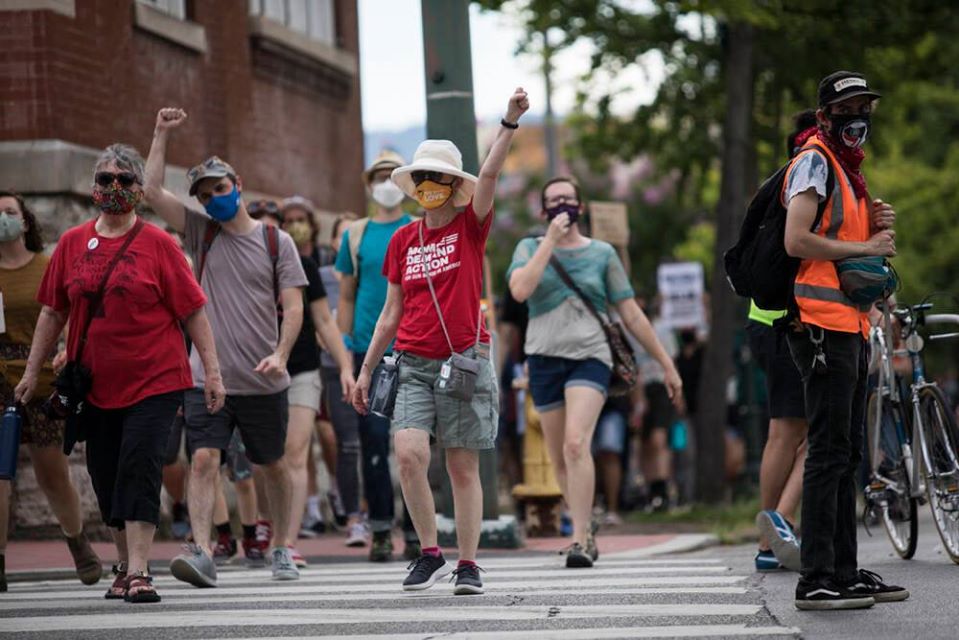
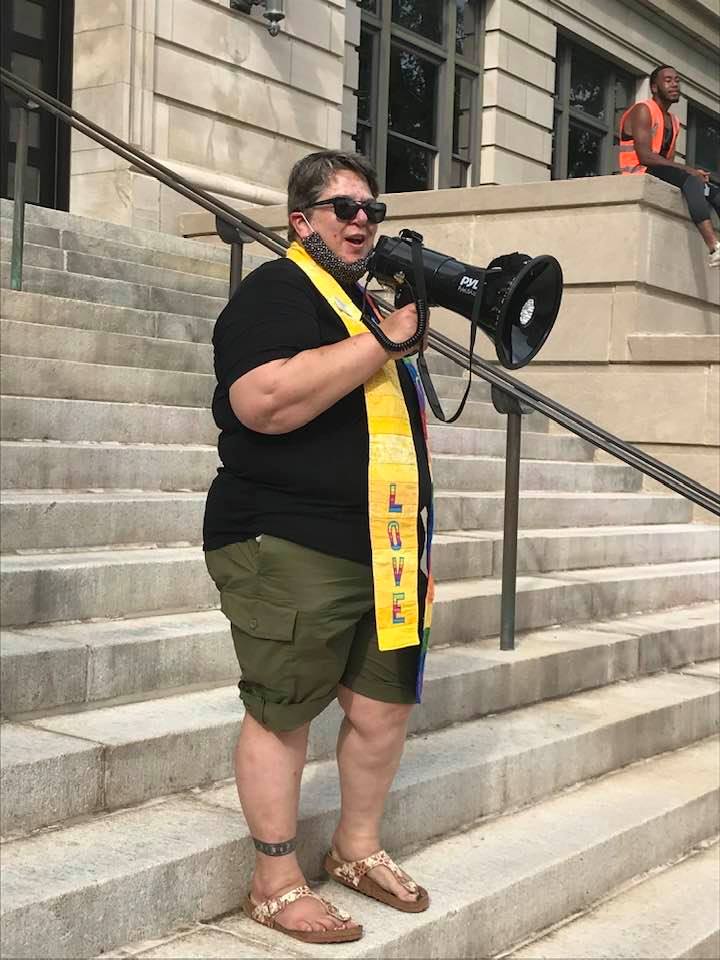
When our 7-year- old daughter came home from school 36 years ago asking “What is religion?,” we decided to take the plunge. Having been invited to UUCC by a work colleague, we gave it a try and are still here. What kept us coming back? Deep relationships, spiritual growth, and a sense of accomplishment from acts of service to the congregation over the years. Has it been perfect? Of course not. But where else could we have found the freedom to explore our own paths while walking with others in pursuing justice and the democratic process?
UUCC, like the Unitarian Universalist Association we belong to, owes its existence to Unitarianism and Universalism. The First Universalist Church of Walker County was founded in 1860 but, suffering casualties from the Civil War, closed the next year. The minister of that church, Rev. J. H. Park (“Uncle Heck”) used the building for a school for a short while afterward and stayed in the area to reappear in our history later.
Our Unitarian history began with All Souls Unitarian Church organized in 1889 and chartered in 1890. The congregation acquired a church building at 654 Houston Street. Its cornerstone was saved and is on the ground near the portico at the current church on Navajo Drive.
A legendary Universalist preacher from New England, Quillen Hamilton Shinn, organized the First Universalist Church of Chickamauga in 1897. Three ministers were called, each serving a short time. Shinn visited and preached there often as did Uncle Heck Park. It dissolved in 1907 the year Shinn died but many of its members had moved to Chattanooga where First Universalist Church of Chattanooga was Shinn’s last organizing effort. Its members met in All Souls Unitarian until they finally opened the doors of their new church, Shinn Memorial Universalist, in 1918.
Both churches flourished during the 1920s but the Great Depression dealt a mortal blow to both. All Souls closed first in 1939. Shinn Memorial lasted into the 1940s but it was just a place for members to meet without a minister until 1951.
In the fall of 1951 a movement began to reorganize the Unitarian Church in Chattanooga. The prime movers in the effort were Helen and Ray Solomon and in November 1951 the Unitarian Fellowship of Chattanooga was organized with 13 members. Fellowship meetings were held in the Hamilton County Courthouse for two years.
In October, 1953 the group began to hold meetings at Shinn Memorial Universalist Church. By 1955 the membership had increased to approximately 50 families and individuals. The group then purchased the building of the former Ridgedale Church of Christ at 1211 Dodds Avenue. For 12 years this was the church home.
During the 1960s when church membership became involved in civil rights activities in Chattanooga, a firebomb was set in the Sunday School building and then the main building was firebombed. An upright piano in the present church still bears the marks of the fire.
The Dodds Avenue building was sold in 1969 when the Navajo Drive land was purchased. Spring Creek School served as a temporary home until the ground floor of the present building was completed in 1970. Ten years later the upper floor was completed and the sanctuary was dedicated as the Jean Livingston Memorial Hall in October 1980.
Significant Events at UUCC Since 1980
1981 Charles White McGehee retires as minister
1981 Jay Abernathy called as minister
1986 George Brook called
1987 Jack Young called
1991 Memorial Garden ground broken
1992 Frances Reece Day interim minister
1993 Melanie Morel Sullivan called
1994 Contract for cell tower (disguised as bell tower)
1998 Building the portico and cell tower
2002 Dana Reynolds III interim minister
2002 Livingstone Memorial Hall
2003 Jeff Briere called
2005 Bottom Parking Lot
2007 Green Sanctuary Certification
2012 Pam Rumancik interim minister
2014 First church in our area to install solar panels
2015 Cathy Harrington contract minister
2016 Black Lives Matter Banner
2018 Rod Harrison contract minister
2019 Mandy Goheen called
2021 Outdoor Labyrinth & Trails
F.A.Q.
Frequently Asked Questions
Where are you located?
We are located on the top of a hill, in East Ridge (Chattanooga) at 3224 Navajo Drive, Chattanooga, TN 37411.
There are special parking places for first-time visitors as well as disability parking spaces in the parking lot at the top of the hill, on the same level as the church. There are also regular parking spaces in that lot. Additional parking is available part way up the hill from the entrance.
What Happens at a Sunday Service?
Elements of our typical Unitarian Universalist Sunday morning service include:
- Gathering music
- Opening words of welcome
- Greeting one another
- Chalice lighting
- Opening song
- Story for all ages
- Children’s recessional
- Meditation and candle lighting
- Sermon or Presentation
- Offertory
- Closing song
- Extinguishing the Chalice
- Closing Words
- Closing Music
What Do Children and Teens Do During Service?
Children and teens generally remain in the sanctuary for the beginning of the service. They may leave for religious education classes together after the Story for All Ages, at approximately 11:15. The children and teens are grouped according to grade level, and they meet with teachers. Classes span a range of interests and activities; they might include arts and crafts, engaging activities and play, social justice projects, and lessons about UUism, history, living our UU values, and other world religions.
Childcare is available most Sundays.
Do You Have Aids for Hearing and Sight Impaired?
We do have aids for the hearing impaired. They are available from the “sound booth” located in the sanctuary. One of our greeters will be happy to help you locate the sound booth and secure the aid.
Is The Church Wheelchair Accessible?
Yes. The sanctuary is on the main level of the building, with a ramp up to the front door.
Our Religious Education wing (downstairs) is accessible by electric chair lift. Please find a staff member to assist.
How Can I Become a Member?
Start off by attending several Sunday services to get to know us better. After you have visited us a couple of times, attend one of our UU101 Membership information sessions. These take place directly after service on the 3rd Sunday of each month. If you then decide that becoming a member is the right thing to do, contact our Minister at minister@uucc.org or our Office Administrator at office@uucc.org.

